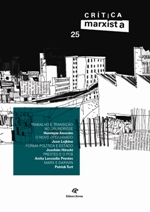Abstract
In this paper we intend to accomplish a reading of the Grundrisse by Marx under the influence of the thesis about immaterial work, specially the thesis that states today the end of the "law of value" as a consequence of the centrality of the immaterial work. Our discussion of the Grundrisse is based on an analysis of the productive forces, the social individual and the social classes. Nevertheless, it intends to apprehend how Marx projects the revolutionized society, i.e., the end of the "law of value". The theory of transition in Marx is related to his analysis of the decrease of the living labor (decrease of the socially necessary labor time to the production of goods) and increase in past labor (increase in the organic composition of capital to the
production of goods). The release/liberation of the exploited labor time leads necessarily to the end of the societies divided in social classes. In this way, we analyze how Marx explain in the Grundrisse the relationship among the constitution of the social individual liberated from the contingences of capital, the use of science as the central productive force and the construction of the communist society under the perspective of social classes.
References
AMORIM, Henrique. Trabalho imaterial, forças produtivas e transição nos Grundrisse de Karl Marx. Crítica Marxista, São Paulo, Ed. Revan, v.1, n.25, 2007, p.9-30.

This work is licensed under a Creative Commons Attribution 4.0 International License.
Copyright (c) 2007 Henrique Amorim
